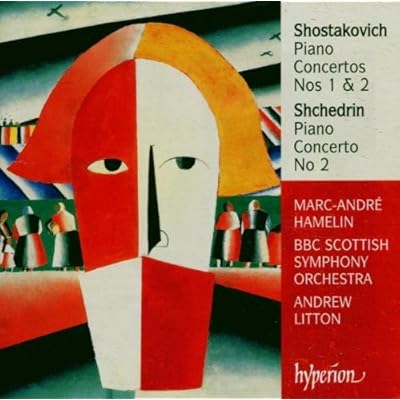
Andrew Litton / Glasgow BBC Scottish Symphony Orchestra
Marc-André Hamelin, pianist
Here are some interesting notes about the composer that I agree with (for the most part):
"Dmitri Shostakovich was the last of the great composers who could be called both traditionalist and modern, and the first of the Russian composers who emerged because of, rather than despite, the Soviet regime. Unlike his compatriots Prokofiev and Stravinsky, both educated in Tsarist Russia, Shostakovich worked entirely under the influence of the communist government, and he struggled all his career with his genuine wish to create art for the state and the state's inability to accept any art it did not understand."
And on the second piano concerto:
"Shostakovich wrote his second Piano Concerto in 1957 as a birthday gift for his 19-year-old son Maxim, a pianist. The piece is full of a light-hearted energy that may owe as much to the composer's relief at the demise of Stalin as to his cheerful wishes for his son.
Both the first and third Allegro movements have a similar structure, each contrasting bright, jaunty tunes against a sort of military tattoo complete with snare drum. The first movement contains fiery lines as well, in an ominous theme of octaves marching up and down the keyboard, and at the broad, dramatic moment when the full orchestra triumphantly roars the main melody.
The second movement, Andante, could easily be mistaken for a composition by Rachmaninoff in its soulful sound. Only strings, piano, and a single horn are heard exchanging tender, lyrical lines, the right hand piano part singing a plangent tune above slow arpeggios in the left. There are no fireworks, only the sort of longing melody one associates with Russian composers of an earlier, more romantic era.
The piano immediately segues into another quick-stepping movement with the second Allegro, this one quite rollicking in tone. There are several sections of rippling scales and arpeggios which, according to Shostakovich, were actually quotes from the well-known finger exercises of Hanon; including them in the concerto, the composer said, was the only way he could force his son to practice them!"
I am a huge fan of Shostakovich's two Piano Concertos, the second of which being perhaps the most marvelous piece of music in the world of sound. The first is much less straightforward than the second, and as such I have found it a little hard to become totally engaged in... it is entirely wonderful, still. I hope I can play these some day :) Aside from the two concertos, this release also features the Piano Concerto No. 2 by none too well known Soviet composer Rodion Konstantinovich Shchedrin. It sounds much like the music of Shostakovich, if not a little less spastic.

No comments:
Post a Comment